

Pronoun Order. When to use "me", "myself" and "I" - Emma Bryce. What’s the difference between ‘me’, myself’, and ‘I’?

To understand what makes these pronouns unique, a good first question is: what are pronouns? You might also want to do a crash course in the difference between a subject and an object. Once you understand these basic rules, you’ll be ready to tackle the pronouns ‘me’, ‘myself’, and ‘I’, and understand their roles in a sentence. The first thing to realize is that they each have totally different jobs. When to use "me", "myself" and "I" - Emma Bryce. When to use "me", "myself" and "I" - Emma Bryce. What’s the difference between ‘me’, myself’, and ‘I’?

To understand what makes these pronouns unique, a good first question is: what are pronouns? You might also want to do a crash course in the difference between a subject and an object. Once you understand these basic rules, you’ll be ready to tackle the pronouns ‘me’, ‘myself’, and ‘I’, and understand their roles in a sentence. The first thing to realize is that they each have totally different jobs. Cases of Pronouns: Rules and Examples. Case refers to the form a noun or pronoun takes depending on its function in a sentence.
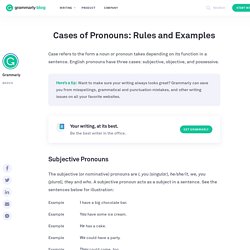
English pronouns have three cases: subjective, objective, and possessive. Here’s a tip: Want to make sure your writing always looks great? Grammarly can save you from misspellings, grammatical and punctuation mistakes, and other writing issues on all your favorite websites. Your writing, at its best. Be the best writer in the office. Get Grammarly.
Personal pronouns. Level: beginner We have both subject pronouns and object pronouns: We use subject pronouns as the subject of a verb: I like your dress.You are late.He is my friend.It is raining.She is on holiday.We live in England.They come from London.
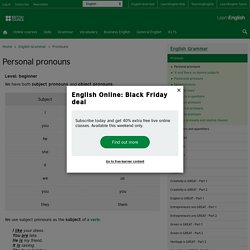
Personal pronouns and possessives. Oliver: Hey, Alfie.
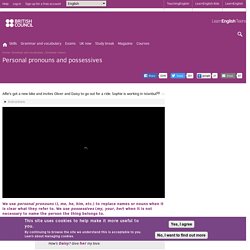
How's things? Alfie: Cool, great.
BBC Learning English - Course: English In A Minute / Unit 1 / Session 49 / Activity 1. 'Who', 'what', 'when', 'where' + ever: What do they mean? - English In A Minute. Ep5_activitysheet_topdf. Study English S1 Ep5: Global Warming - Learn English - Education. In this episode we will be looking at ways of brainstorming, taking notes and developing ideas.

Our topic will be global warming and the environment. Transcript Hello. I’m Margot Politis. Welcome to Study English, IELTS preparation. Today we’re going to look at a topic you’ve probably heard a lot about – global warming and the environment. First we’re going to look at ways of brainstorming, taking notes and developing ideas. Watch while we play some vision that contains ideas about the causes and effects of global warming… While you watch, try to note down some of your ideas about what global warming is. OK so you saw some ideas, and perhaps took some notes, during that clip.
There are more than 70 pronouns. Here's the full list… Pronouns. Grammar Quiz #13: Pronouns. Grammar Quiz #23: Pronouns. By Mark Nichol - 2 minute read Correct errors of pronoun use in the following sentences. 1.

Do you want to go with Hamed and myself to the park? 2. Last summer, the Retys were extremely kind to my family and I when we stayed with them. 3. 4. 5. Tricky Indefinite Pronouns. Tricky Indefinite Pronouns: In most cases, it is clear whether a pronoun's antecedent is singular or plural.
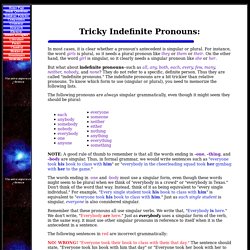
For instance, the word girls is plural, so it needs a plural pronoun like they or them or their. On the other hand, the word girl is singular, so it clearly needs a singular pronoun like she or her. There are more than 70 pronouns. Here's the full list… Relative Clauses and Relative Pronouns. Indefinite pronoun singular plural at DuckDuckGo. Whoever, whatever, and whichever: plural or singular? Question Sanjaya in Nepal asked: Which is correct, "Whoever wants...
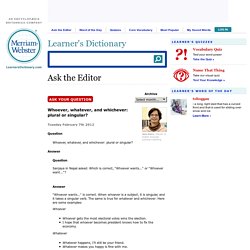
" or "Whoever want... "? Answer "Whoever wants... " is correct. Economist. What is a Pronoun? Types of Pronouns & Examples. Self-grading multiple-choice exercises.
Self-grading multiple-choice exercises. Reciprocal Pronouns. Personal Pronouns. What Are the Types of Pronouns? The eight types of pronouns are personal, possessive, reflexive, reciprocal, relative, demonstrative, interrogative, and indefinite.
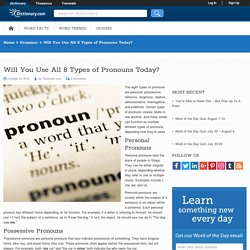
Certain types of pronouns closely relate to one another, and many words can function as multiple different types of pronouns, depending how they’re used. Personal Pronouns Personal pronouns take the place of people or things. They can be either singular or plural, depending whether they refer to one or multiple nouns. Kaplan GMAT Sample Problem: Sentence Correction Pronouns. Today we will be looking at a sentence correction problem that features a pronoun error. Pronoun errors are fairly common on the GMAT, so you want to be ready for them. Remember, when you see a pronoun, it must match its antecedent (the word it is replacing) in number and it must be unambiguous – that is, you must know without any doubt what the pronoun’s antecedent is.
Problem: During World War II, “code talkers” were Native American soldiers that were specifically recruited to develop codes based in the Navajo language; these codes made any intercepted communications virtually indecipherable. (A) that were specifically recruited to develop codes based in the Navajo language (B) who were specifically recruited to develop codes based in the Navajo language (C) that used the Navajo language to develop the codes they were specifically recruited for.
Who Versus That. Page 1 of 2 Today's topic is who versus that. Lesley called in with this question: My pet peeve is who versus that, as in “You know Bob, he's the guy that sold me my car.” It drives me nuts. Or am I mistaken and it's just become part of the new English verbiage in the evolution of the language? I kind of talked about this question in episode 7, but other people have also asked the same thing recently, including Corinne, so I thought it would be worth going into a little further.
Possessive Pronouns. Possessive Pronouns. Indefinite Pronouns. Whom, Whose, and Who's. Certain English words can be confusing for English-language students because they sound alike, or have similar spellings. Three common ones are whom, whose and who’s. Whom.